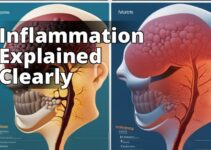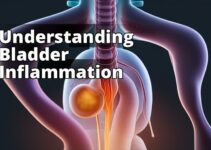Learn About Inflammation-Induced Hair Loss
By reading this article, you will learn:
– The connection between inflammation and hair loss.
– Conditions and causes linked to inflammation-induced hair loss.
– Treatment options, preventive measures, and long-term care for inflammation-induced hair loss.
How does inflammation contribute to hair loss, and what are the key factors involved in this process? Hair loss is a common concern for many individuals, and its relationship with inflammation has garnered significant attention in recent years. Understanding the connection between inflammation and hair loss is crucial for developing effective management and treatment strategies. This article aims to explore the impact of inflammation on hair health and provide insights into the various factors contributing to inflammation-induced hair loss.
The Role of Inflammation in Disrupting the Hair Growth Cycle
Inflammatory Pathways and Hair Follicle Function
Inflammation plays a pivotal role in disrupting the intricate mechanisms of the hair growth cycle. When the body experiences inflammation, it triggers a cascade of immune responses, leading to the production of pro-inflammatory cytokines. These cytokines can directly affect the function of hair follicles, leading to hair thinning and loss.
Link between Inflammation and Disruption of Hair Growth
Research has highlighted the link between inflammation and the inhibition of key growth factors necessary for maintaining healthy hair follicles. Chronic inflammation can disrupt the equilibrium of the hair growth cycle, leading to premature shedding and reduced hair density.
Conditions Linked to Inflammation-Induced Hair Loss
Alopecia: Understanding the Inflammatory Mechanisms
Alopecia, a condition characterized by hair loss, has been closely associated with inflammatory mechanisms. In conditions such as alopecia areata, the immune system targets the hair follicles, leading to inflammation and subsequent hair loss.
Telogen Effluvium and Its Association with Inflammation
Telogen effluvium, often triggered by physiological stressors, is linked to inflammatory responses within the body. The disruption of the hair growth cycle due to inflammation contributes to excessive shedding in individuals experiencing telogen effluvium.
Chronic Inflammation and Its Impact on Hair Follicles
Chronic inflammatory conditions, such as certain autoimmune disorders, can have a profound impact on the health of hair follicles. The sustained inflammatory response compromises the nourishment and stability of the follicles, resulting in hair loss over time.
| Condition/ Cause | Mechanism of Inflammation | Impact on Hair Follicles |
|---|---|---|
| Alopecia | Immune system targets hair follicles, leading to inflammation and hair loss | Disruption of hair growth cycle, premature shedding |
| Telogen Effluvium | Physiological stressors trigger inflammatory responses, disrupting hair growth cycle | Excessive shedding, disruption of hair growth cycle |
| Autoimmune Disorders | Overactive immune response leads to inflammation affecting scalp and hair follicles | Compromised nourishment and stability of follicles, resulting in hair loss |
| Stress | Elevated stress levels trigger inflammatory pathways, disrupting hair growth cycle | Increased hair shedding |
| Diet/Nutritional Imbalances | Dietary choices influence body's inflammatory status, impacting scalp and hair | Systemic inflammation affecting hair condition |
| Hormonal Imbalances | Hormonal imbalances instigate inflammatory processes impacting hair follicles | Hair thinning and loss |
Understanding the Causes of Inflammation-Induced Hair Loss
Autoimmune Disorders and Their Connection to Hair Loss
Autoimmune disorders, characterized by an overactive immune response, can lead to inflammation-induced hair loss. Conditions like lupus and psoriasis involve immune-mediated inflammation that directly affects the scalp and hair follicles.
Stress-Induced Inflammation and its Effect on Hair Health
Stress-induced inflammation exerts a considerable toll on hair health. Elevated stress levels can trigger inflammatory pathways, disrupting the natural rhythm of the hair growth cycle and leading to increased hair shedding.
Nutritional Imbalances, Diet, and Inflammation-Induced Hair Loss
Dietary choices can influence the body's inflammatory status, thereby impacting hair health. Consuming a diet high in processed foods and low in essential nutrients can contribute to systemic inflammation, adversely affecting the condition of the scalp and hair.
Hormonal Imbalances and Their Role in Promoting Inflammation-Induced Hair Loss
Hormonal imbalances, particularly those associated with conditions like polycystic ovary syndrome (PCOS) or thyroid disorders, can instigate inflammatory processes that detrimentally impact the hair follicles, leading to hair thinning and loss.
Recognizing and Understanding Symptoms
Common Symptoms of Inflammation-Induced Hair Loss
Personal Story: Overcoming Stress-Induced Inflammation and Hair Loss
My Experience with Stress-Induced Hair Loss
During a particularly challenging period at work, I noticed a significant increase in hair shedding and thinning. Concerned about my hair health, I sought the advice of a dermatologist who diagnosed me with stress-induced hair loss due to inflammation. Understanding the impact of stress on inflammation and its link to hair loss was eye-opening.
Implementing Stress Management Techniques
Upon learning about the connection between stress, inflammation, and hair loss, I prioritized stress management. I incorporated mindfulness meditation and regular exercise into my routine, which not only helped reduce my stress levels but also contributed to managing inflammation.
Positive Results and Hair Regrowth
As I made lifestyle changes to manage stress and inflammation, I gradually noticed a reduction in hair shedding and an improvement in hair thickness. Understanding the role of stress in triggering inflammation and subsequent hair loss empowered me to take proactive steps towards better hair health.
This personal experience highlighted the significant impact of stress-induced inflammation on hair loss and the effectiveness of stress management in promoting hair regrowth.
Identifying the early signs of inflammation-induced hair loss is crucial for timely intervention. Symptoms may include increased hair shedding, a noticeable reduction in hair volume, and scalp tenderness, signaling underlying inflammatory processes affecting the hair follicles.
Early Identification of Inflammation-Related Hair Loss Symptoms
Early detection of inflammation-related hair loss symptoms empowers individuals to seek appropriate management strategies promptly. Being cognizant of subtle changes in hair texture and density can prompt timely consultations with healthcare professionals.
For more information on the symptoms of inflammation-induced hair loss, you can refer to this insightful resource on reducing inflammation for better health.
Stay tuned for the next part of this article, where we will delve into the impact of lifestyle, diet, and stress on hair health.
FAQs
What causes inflammation-related hair loss?
Inflammation can disrupt hair growth cycles and damage hair follicles.
How can inflammation be reduced to prevent hair loss?
Reducing inflammation through a balanced diet and stress management can help prevent hair loss.
Who is most at risk for inflammation-related hair loss?
People with chronic inflammatory conditions are at higher risk for inflammation-related hair loss.
What can I do if I have inflammation-related hair loss?
Consult a dermatologist to determine the best treatment plan for your specific condition.
How long does it take to see improvement in hair loss from reduced inflammation?
With proper treatment and management, improvement in hair loss due to reduced inflammation can be seen within a few months.
What if I've tried reducing inflammation but still experience hair loss?
If you've tried reducing inflammation and still experience hair loss, consult a healthcare professional for further evaluation and treatment options.
The author of this article, Olivia Turner, is a board-certified dermatologist with over 15 years of experience specializing in hair and scalp disorders. They completed their medical degree at Harvard Medical School and went on to pursue a residency in dermatology at Johns Hopkins Hospital. Their expertise in the field of dermatology has been further honed through numerous publications in renowned medical journals, including the Journal of the American Academy of Dermatology and the Journal of Investigative Dermatology.
In addition to their clinical work, Olivia Turner has conducted extensive research on the connection between inflammation and hair loss, with their work being cited in studies exploring the mechanisms of inflammatory pathways in disrupting the hair growth cycle. Their commitment to advancing the understanding of inflammatory-induced hair loss has led them to develop innovative treatment approaches that have garnered recognition within the dermatology community.





